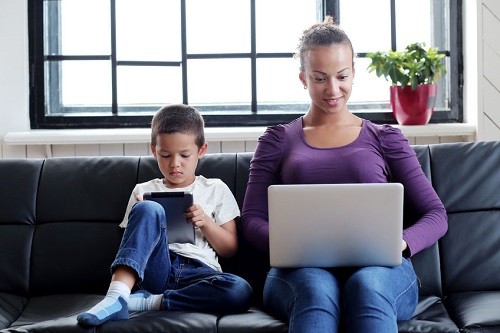Many parents mistakenly believe that children who spend most of their time at home are out of danger. Unfortunately, they’re absolutely mistaken, because the Internet has become one of the biggest hazards of a modern humanity.
Websites are full of shady and immoral content, consisting of violence, pornography, advertisements, hatred, deceit and other dangerous things. Unlike adults, small kids just absorb this information. They don’t know how to resist various temptations, false teachings and negativity.
Many small users of social networking websites often become the victims of cyber bullying. Have you ever heard something about cyber attacks? Today people can easily offend, humble and intimidate each other, using electronic technologies. Adults realize that cyber bullying isn’t dangerous and serious thing, because in most cases it doesn’t threaten physical safety. Cyber bullying is the choice of mentally weak, but cunning people who want to destabilize the emotional well-being and damage the self-esteem of certain or random personalities. Children tend to take everything too seriously and believe that threatening words will turn into reality in a quite short period of time.
In my opinion, during the pre-adolescent and adolescent periods parents should help their kids get acquainted with the Internet and teach them to use its resources responsibly and safely. Read on to discover how to do it.
1. Lay down rules
This is the most important step to start from, because you’re a parent. Every family has its standards, traditions and parents have the right to make rules. These rules usually help all family members get along better and protect them from different dangers.
When making rules, do it carefully. Too much control can urge children to go underground or even turn them into revolutionists. Both adults and children know that forbidden fruit is always sweet. If you don’t want this trouble to happen, try to accustom kids to the rules using an authoritative approach instead of authoritarian one.
In case you children say that they forget about some rules, you should create an effective reminder. Make a list of your rules, then type and put it in front of the computer for children to see and remember what they can do and what is strictly forbidden. But it won’t work, if your child has a modern smartphone or other electronic gadgets that can easily connect to the Internet.
Generally, children shouldn’t have access to the Internet until they become teenagers. If you think that they’re crucially important to both kids and adults, then your children should enjoy the Internet under your strict control for the sake of their emotional well-being.
2. Pay attention to your child’s emotional state
Cyber bullying has a significant negative impact on children’s mental health. But how can you understand that your kid is the victim of cyber hooligans? You’re a parent and the only one who knows your child very well. Every day you should pay attention to their words, actions and analyze everything happening in their lives. Sometimes strange emotions or unusual behaviors can be the signs of a problem hidden somewhere in the depth of their scared and confused eyes.
Many children tend to draw the curtain on their life issues and often feel shame about asking for help, especially when it comes to their personal life. They may look dispirited during the day and show reluctance to attend school or communicate with others. Realize that chronic stress and isolation from normal interaction with others can lead to psychological disorders.
If you notice that your kid behaves strangely after spending a few hours in front of the computer, you should break the silence and talk to them, trying to understand what is going on. Do your best to reassure the child that everything you talk about will remain confidential. If there’s no trust in relationship between you and your kid, you’ll never know the truth.
3. Encourage your child to be sociable
Sociable and confident children who have a lot of true friends are less prone to different types of bullying, and cyber bullying is no exception. Cyber hooligans choose diffident, closed and weak victims, because they’re the ones who’ll easily swallow the bait. These kids can’t resist various manipulations, because they lack mental power and have no friends who’ll cheer them up, give a valuable advice or lend a shoulder during a difficult time. As a result, they retire to their shells and come face to face with hooligans’ manipulations and blackmails.
If your children are incommunicable introverts by nature, then you should do all possible and impossible to become their friend. In case, they’re communicative extroverts, then encourage them to communicate more with their peers and develop healthy friendships.
Read also – 7 Signs Your Children Are Truly Happy
4. Set up parental controls
Today, parents have an opportunity to protect kids from the Internet dangers with a help of modern technology. The main thing is to be tech savvy and have a strong desire to bring up healthy, full-fledged and all-rounded kids.
Many operating systems include programs that monitor Internet traffic, prevent access to harmful websites and provide professional Internet protection. Parents install and use these programs to see the content, viewed by their children and prevent them from revealing confidential information on social media. Wise people say that prevention is the best and the most effective solution to almost all problems.
5. Set a good example
No matter how you slice it, you’ll never teach and change your kids for the better, if you set a bad example for them. Your bad behavior is a terrible gesture. It shows kids that their parents don’t respect them, if they allow themselves to do the things that according to the family statute are forbidden.
If you don’t change your attitude, you’ll quickly lose trust and break emotional connection between you and your child. Children who grow up in the families where mutual understanding and respect aren’t a priority, usually spend more time online trying to find support, friends and answers to various important questions.
6. Your child should understand what online reputation is
Oftentimes, children haven’t the remotest idea of what virtual reality is. They mistakenly believe that it’s just a game, where there’re no rules and they can behave the way they like. Every modern kid that has a free access to the Internet should have a clear understanding of its structure, function and possible dangers.
As an experienced Internet user, you should teach your child to behave in the virtual reality properly, because a virtual world has much in common with a real one. Children should feel the responsibility for the information they post online. Make sure your child doesn’t add any photos or information that can break their own or family’s confidentiality.
Furthermore, they should know that provocative pictures and statements can seriously damage their both online and social reputation. It’s important to realize that social network accounts are like questionnaires that reflect our characters, lifestyles, views, attitudes, interests, hobbies, relationships and many other private things. Online reputation is a difficult thing, but I hope you’ll find correct words to explain to your kids that it’s necessary to create and maintain positive online reputation for the sake of their future success.
7. Put your family computer in a visible place
The power of temptation is one of the strongest things in this world. It can lead almost everyone up the garden path and tempt to do things they’re not allowed to do. If you don’t use parental control programs, you should keep the child’s computer in the room often visited by you or other members of the family for children to keep in mind that visiting forbidden websites is a bad and risky idea. Plus, you’ll have a chance to communicate more with your child. This tricks works well during the pre-adolescent and adolescent periods. Teenagers will find ways to deceive you, because they’re more inventive and more curious.
Read also – 7 Common Modern Parenting Myths
The Internet safety for kids should become a top priority for modern parents, because children are our future. If you don’t want your “future” to have psychological problems, you should modify your home computer by installing special Internet safety programs. But sometimes, it’s not enough, because much depends on the process of upbringing and relationship between you and your kids. Do you believe that the Internet can affect children’s emotional well-being? What way do you protect your kids from the Internet hazards? Share your point of view.








